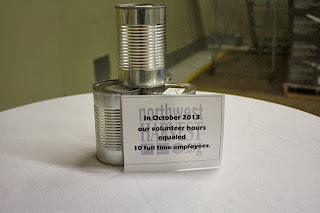By Stephanie Marin, Advocacy Assistant
 |
Executive Director Robert Coit in the
Thurston County Food Bank Receiving Area |
 |
Food donations are sorted by type and
input in a custom database that helps
TCFB more accurately calculate the
dollar value of in-kind donations |
Down in Olympia, Thurston County Food Bank (TCFB) under the
direction of Robert Coit, continues to provide innovative services to meet the
needs of their community. The main food
bank in downtown Olympia serves clients three days a week on Mondays,
Wednesdays, and Fridays. Satellite food
pantries, however, allow the food bank to reach a wider variety of clients. TCFB utilizes their network of volunteers to
sort food and provides this food to their 17 satellite sites. Not having to source food or volunteers makes
it easier for these small food pantries to provide aid and gives Thurston
County residents options to find food seven days a week.
 |
Different Color Tickets Designate the
number of each type of food clients can pick up |
 |
| Specialty Foods and Baby Care Shelf |
If clients decide to go to the TCFB over one of the satellite
locations, they are checked in and given tickets for each individual section
based on family size. Clients can also
request separate tickets if someone in their family has a special dietary need
such as sugar free or gluten free foods.
Staple items are separated onto three identical shelves. This prevents overcrowding and makes sure
everyone gets through the food bank in a timely fashion.
Odd items and coveted items like coffee have
a special place in the food bank in the “bonus” section. This section is only for people who remember
to bring their reusable shopping bags.
So far, the incentive has worked and saved the food bank time and money
for plastic grocery bags!
 |
| The Repack Kitchen |
TCFB relies on a variety of methods to keep their shelves
stocked and minimize waste. Due to the
large contingency they serve, much of TCFB’s food comes from bulk purchases of
staples such as cereal and canned goods.
Produce and other fresh foods are often donated from grocery stores and
gleaning projects while food drives are relied on to provide variety in
the type of food offered. TCFB also
works with restaurants and a local school district to recover unserved food in
a program they call “restaurant rescue.”
 |
This box machine allows TCFB to repackage
Restaurant Rescue Meals in a snap! |
This food is taken from the restaurants and school district back to TCFB’s
repack kitchen and boxed into family size servings for food bank clients. The food bank also makes sure to take
advantage of their influx of volunteers and squash this time of year by
scooping, cutting, and otherwise prepping the winter squash to make it easier
for clients to cook and eat. This means
more squash is taken and less becomes compost!
 |
| Presorted boxes of food for the ForKids Backpack Program |
On top of all this, TCFB provides 2000-3000 children food
per week through their backpack program
ForKids, has an in person assister for health
care, and processes basic food applications!
Now in the middle of a capital campaign, they expect to expand square
footage and services even more. A new
warehouse off-site will free up some space inside the current building. With this extra room, they hope to enhance
client experience with a better waiting area and even more office spaces for
services. To learn more about Thurston
County Food Bank, Please visit:
http://thurstoncountyfoodbank.org/
 |
| Volunteers are well appreciated at TCFB! |
 |
| Volunteers help sort food and organize the storage space |
 |
| Cranberry sauce in time for Thanksgiving! |
 |
| Thanksgiving essentials bags prepped for satellite food pantries |
 |
| Some of the produce offerings at TCFB |


























 transportation and human services. The city's Food Action Plan strategy to provide "Healthy Food for All" will receive $136,000 to further advance the goals of the Healthy Food for All strategy. This strategy provides access to healthy local food for at least 1,250 children and older adults, and connects 30 senior and child care programs to local farms and locally grown produce. Additionally, $28,000 is provided for the Human Services Department to glean fresh fruits and vegetables to be distributed to Seattle food banks. These funds are in addition to the $200,000 in funding for the emergency food system and food banks in last year's 2013 fiscal budget and continues into next year.
transportation and human services. The city's Food Action Plan strategy to provide "Healthy Food for All" will receive $136,000 to further advance the goals of the Healthy Food for All strategy. This strategy provides access to healthy local food for at least 1,250 children and older adults, and connects 30 senior and child care programs to local farms and locally grown produce. Additionally, $28,000 is provided for the Human Services Department to glean fresh fruits and vegetables to be distributed to Seattle food banks. These funds are in addition to the $200,000 in funding for the emergency food system and food banks in last year's 2013 fiscal budget and continues into next year.